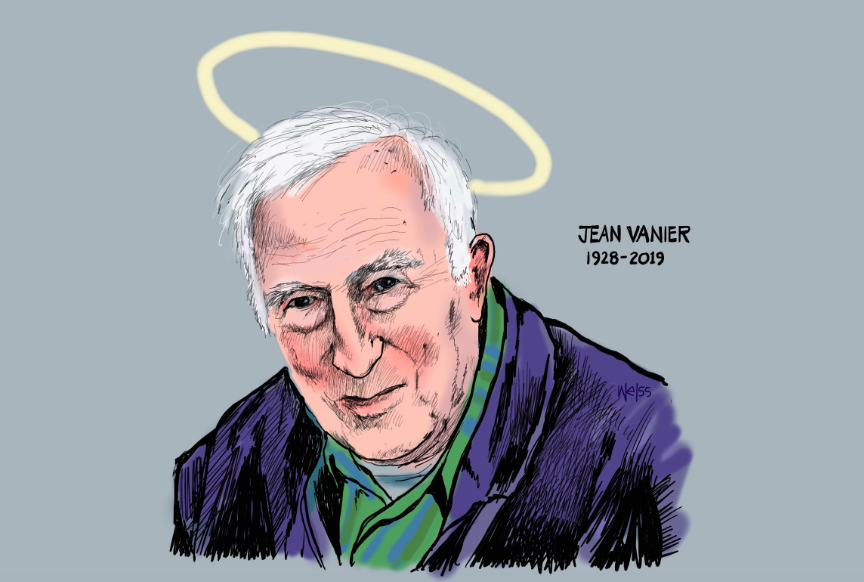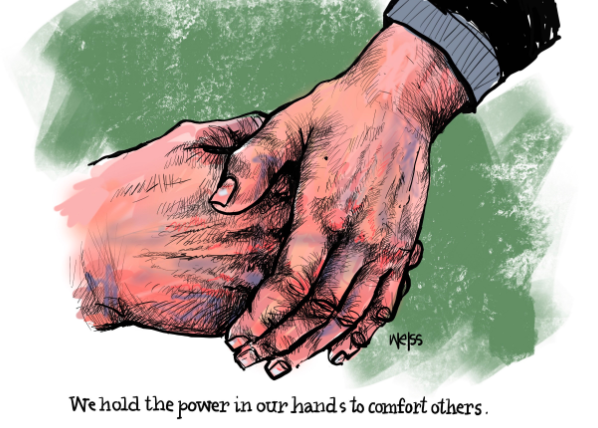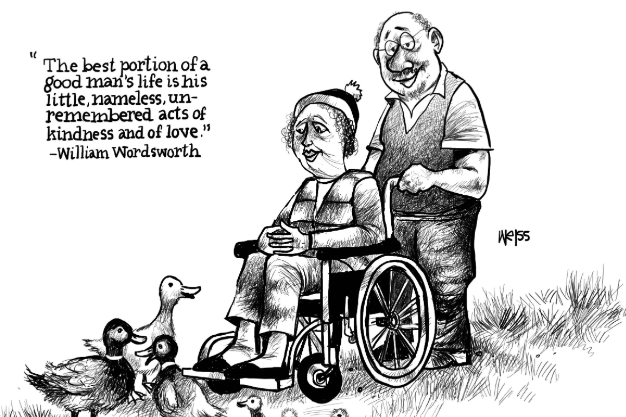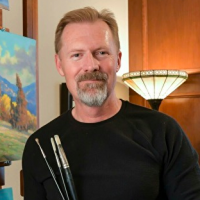When he first visited the asylum for the mentally disabled, Jean Vanier was overwhelmed by the filth and overcrowding. It was inhuman.
The year was 1964 and Vanier, a French-Canadian philosopher/theologian who had served in the Navy, was still figuring out his path in life.
One of the residents in the asylum asked Vanier if he would be his friend. What happened next defined Vanier’s life work, and set an example for the rest of us who want more meaning in our lives.
Vanier invited the resident and another disabled man to live with him in a modest house in Trosly-Breuil, France. It was here that Vanier fed and washed the disabled men. Others would come, and Vanier named his care home “L’Arche” after Noah’s Ark.
“We are not called by God to do extraordinary things, but to do ordinary things with extraordinary love.” ~ Jean Vanier
Vanier’s model of care grew into L’Arche International, serving in 38 countries and five continents, with over 10,000 members (with and without disabilities).

The light that is shining in them
When I was a police chief in California, our agency used to participate in the annual Special Olympics summer games. My lieutenant and I, in our formal uniforms, would drive an hour to the host city.
We attended planning meetings and a luncheon, but the best part was interacting with the athletes before the games. We’d play catch or kick a soccer ball around. It was a lot of fun. The enthusiasm, affection, and charm of the athletes were infectious.
There were no pretensions, mind games, or duplicity. The athletes were the embodiment of love and authenticity. All they wanted was for us to treat them like everybody else.
“We all know well that we can do things for others and in the process crush them, making them feel that they are incapable of doing things by themselves. To love someone is to reveal to them their capacities for life, the light that is shining in them.” ~ Jean Vanier, From Brokenness to Community
The athletes didn’t want any special accommodations. They simply wanted to compete, have fun, laugh, and share their joy for life with us. I learned a lot from them about being in the moment, and that happiness can be found in everyday living.
As Jean Vanier once told a Wall Street Journal writer: “The great thing about people with intellectual disabilities is that they’re not people who discuss philosophy. What they want is fun and laughter, to do things together and fool around, and laughter is the heart of community.”
Vanier went on to state: “What I’m trying to live and trying to say is that people with disabilities are important—in themselves but also they have a message to give to humanity.”
My sister, who is a kind-hearted soul, used to work with intellectually and developmentally disabled children. I remember visiting her once at work and seeing the affectionate way the children interacted with her.
It was moving. Even now, it makes me wish that everyone could possess the same authenticity, affection, and joy for everyday life that these young, intellectually disabled children display.

Presence to others
As we age, we lose a great deal of our childhood innocence. Our curiosity and imaginations succumb to adolescence, hormones, and the complexities of adulthood.
We become concerned about our appearance, popularity, and success. We compete in the workplace and learn that communication involves what we say versus what we really mean. We worry about things like status and social rank.
We try to create a safe little world for ourselves, devoid of risk and averse to vulnerability. Only, over time, we’re still not happy.
“He who clutches desperately to security, to everyday habits, work, organization, friends, family, no longer lives. More than security, life needs adventure, risk, dynamic activity, self-giving, presence to others.” ~ Jean Vanier, Tears of Silence
In order to achieve the best life ever, we need to get out of our own way. Let go of our petty insecurities, accept our strengths and weaknesses, and rediscover the joy found in being present and helping others.
10 simple rules for the best life ever
Thankfully, Jean Vanier left us a roadmap for how to live a better life. How to capture some of the joy that he experienced every day caring for his friends at L’Arche. They are 10 simple rules.
Follow them to help you live the best life:
1. Accept the reality of your body. As Vanier noted, we are born in weakness and die in weakness. There’s nothing wrong with trying to improve your body and health, but learn to accept yourself as you are. There are so many more important things to focus on, like being present and helping others, which enrich us far beyond our physical appearance.
2. Talk about your emotions and difficulties. We tend to have difficulty expressing our emotions, yet they drive so much of what we do. Worse, we compensate with drugs and alcohol to mask our feelings of not being successful. Talking about how we feel, honestly, can free us.
3. Don’t be afraid of not being successful. We erroneously equate being loved with being successful, but as Vanier said, “You are beautiful as you are.” The true measure of a person is not defined by the size of his/her bank account. It’s defined by their emotional bank account. How kind they are. How they treat others. We might envy Mark Zuckerberg’s wealth, but admire people like Mother Teresa more.
4. In a relationship, take the time to ask: “How are you?” You’re married to your spouse, not success. Yes, work is important to provide for our families. But being there for our families is even more important. Take the time to check-in. Ask how your spouse and kids are doing. They’ll remember your thoughtfulness and love much more than your career success.
5. Stop looking at your phone. Be present! The digital age has brought us instant communication, but are we really talking to one another?
6. Ask people: “What is your story?” Everyone has a story if you’re willing to listen. Stop trying to change other people and truly meet them. Just because they don’t share your views, doesn’t mean they don’t have their own stories, experiences, and wisdom. Learn their story, and stop judging.
7. Be aware of your own story. You are just as precious as every other human being. Appreciate your own uniqueness and talents.
8. Stop prejudice: meet people. Jean Vanier spoke of the “tyranny of culture.” My group. My party. My culture. Yes, be proud of who you are and your culture, but not at the expense of others. Become a member of humanity. It just might transform you.
9. Listen to your deepest desire and follow it. Unlike animals, human beings have moral and spiritual needs. Beyond eating, procreating, and existing, we search for the infinite. The reason why we are here. All of us have an inner voice that guides us. Our hearts often tell us when we are off course. Learn to trust your heart.
10. Remember that you will die one day. Jean Vanier noted that “We’re all here, but we are just local people. Passengers on a journey. We get on and off the train and the world will continue.” Facing our mortality can help guide our actions today. It can reshape the kind of person we want to be.

Your moral purpose
The wisdom of aging is that many of the things we thought were so important, like our looks, wealth or status, really aren’t important. What matters more is our character. How we treat others.
There is much more to the world than money, competition, and material pleasures. While there’s nothing wrong with having ambition and becoming successful, the trick is to never lose sight of your moral purpose.
The minute you trade your kindness and humanity to make a buck or get ahead in life, you really end up shortchanging yourself. In the twilight of your life, the sweetness of ill-begotten success succumbs to a kind of bitterness.
Jean Vanier passed away recently in his 90th year. He was truly a saint on Earth. Thankfully, he left much wisdom for us to learn from. In a 2015 interview he shared the following:
“Try and find somebody who is lonely. And when you go to see them, they will see you as the messiah. Go and visit a little old lady who has no friends or family. Bring her flowers. People say, ‘But that’s nothing.’ It is nothing—but it’s also everything.”
~












Read 3 comments and reply